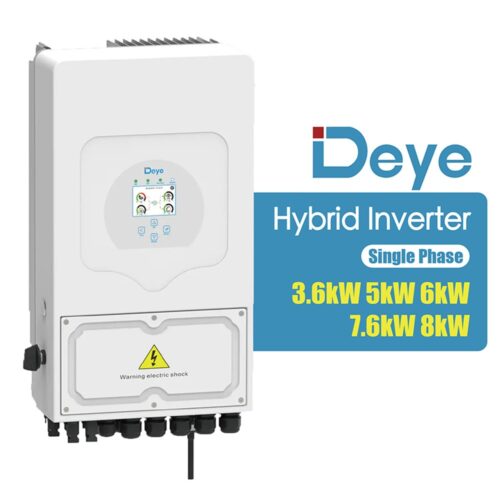| On grid solar inverter 70kW, Three Phase |
| Power: 70kW 75kW 80kW 90kW 100kW 110kW |
| Warranty: 5 year |
| Brand: Deye |
Deye On Grid Solar Inverter 70kW 80kW 90kW 100kW 110kW
Description

On Grid Solar Inverter 70kW
Deye High-Capacity (70kW, 80kW, 90kW, 100kW, 110kW) Inverters vs. Low-Capacity Inverters: Technical Differences and Varied Applications and Usage
In the world of solar energy, the choice between high-capacity and low-capacity inverters depends on various factors, including technical specifications, application requirements, and usage scenarios. Deye’s High-Capacity On-Grid Solar Inverters, ranging from 70kW to 110kW for three-phase systems, offer distinct technical advantages and cater to different application scenarios compared to low-capacity inverters. In this comprehensive guide, we will explore the technical differences, application suitability, and usage nuances between Deye’s high-capacity and low-capacity inverters.
Technical Differences: High-Capacity vs. Low-Capacity Inverters
- Power Output: The primary technical difference lies in power output. High-capacity inverters like Deye’s 70kW to 110kW models can handle significantly larger energy loads compared to low-capacity inverters, making them ideal for larger installations.
- Efficiency: High-capacity inverters often boast higher efficiency rates due to their advanced design and components. This efficiency is crucial for extracting maximum energy from larger solar arrays. On Grid Solar Inverter 70kW
- Scalability: High-capacity inverters are more scalable, allowing for future expansion of solar installations. They can accommodate additional panels and energy generation capacity as needs grow. On Grid Solar Inverter 70kW
- Grid Compatibility: The electrical grid infrastructure and requirements play a significant role in inverter selection. High-capacity inverters are typically designed for compatibility with larger commercial and industrial grid systems.
- Physical Size: High-capacity inverters are physically larger than low-capacity ones to accommodate the components needed for handling higher power loads. On Grid Solar Inverter 70kW
Application Suitability and Usage Scenarios:
- Large Commercial and Industrial Facilities: High-capacity inverters are ideal for powering large commercial and industrial facilities with substantial energy demands. They ensure efficient energy conversion and cost savings in such settings.
- Grid-Scale Solar Farms: Solar farms that feed energy into the grid benefit from high-capacity inverters. They can efficiently manage the power generated by vast arrays of solar panels. On Grid Solar Inverter 70kW
- Multi-Tenant Buildings: In commercial and residential buildings with multiple tenants, high-capacity inverters distribute solar energy to various units effectively, reducing energy costs for all occupants.
- Agricultural Operations: Farms and agricultural facilities, including irrigation systems, often require a high-energy capacity to meet operational needs efficiently.
- Schools and Universities: Educational institutions with large campuses can harness the power of high-capacity inverters to meet their energy requirements and promote sustainability. On Grid Solar Inverter 70kW
Usage Nuances: High-Capacity vs. Low-Capacity Inverters
- Sizing Considerations: When selecting an inverter, consider the size of your solar installation and your current and future energy needs. High-capacity inverters are suitable for large-scale projects, while low-capacity inverters are ideal for smaller residential installations.
- Grid Connection: Ensure that the selected inverter capacity aligns with the requirements of your local grid. High-capacity inverters may require specific grid connections and permits. On Grid Solar Inverter 70kW
- Space Requirements: High-capacity inverters demand more installation space due to their larger size. Ensure that you have adequate space for the inverter and accompanying equipment.
- Cost Considerations: High-capacity inverters are generally more expensive than low-capacity ones due to their advanced features and capabilities. Evaluate the return on investment and cost-effectiveness for your specific application.
Conclusion:
Deye’s High-Capacity On-Grid Solar Inverters, including the 70kW, 80kW, 90kW, 100kW, and 110kW models, offer a distinct set of technical advantages and cater to larger-scale applications compared to low-capacity inverters. The choice between high-capacity and low-capacity inverters ultimately depends on the scale of your solar project, energy needs, and grid compatibility. Whether you are powering a massive industrial facility or a small residential home, Deye’s range of inverters provides versatile and reliable solutions for harnessing solar energy efficiently. Understanding the technical differences and application suitability is crucial in making the right choice for your specific solar energy requirements.





